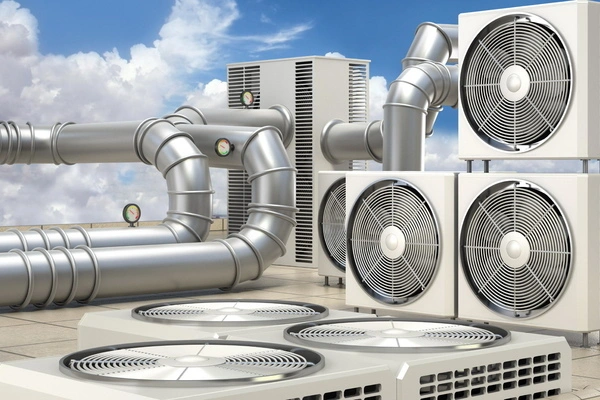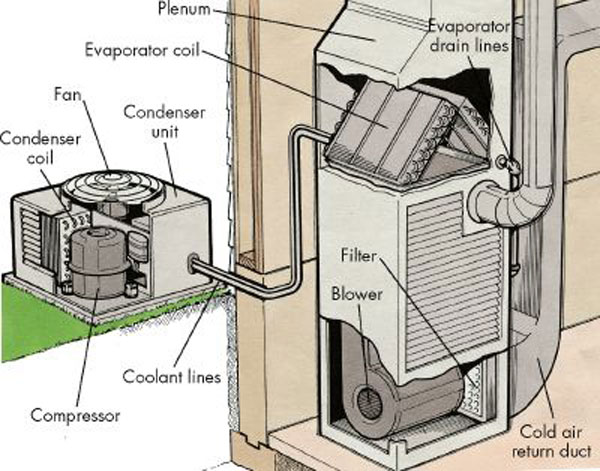See why organizations choose HVAC experts for efficient climate management
Discovering the Necessary Parts of an Efficient Heating And Cooling System
A reliable cooling and heating system is constructed on numerous critical parts that operate in harmony. Each part, from the thermostat to the ductwork, plays an important role in keeping comfort and power efficiency. Recognizing these aspects is critical for enhancing efficiency and improving interior air top quality. As one takes a look at these elements, the complex connections in between them disclose insights into improving overall system effectiveness. What details variables add most to this effectiveness?
The Duty of the Thermostat in Heating And Cooling Efficiency

Typically neglected, the thermostat plays an important duty in the efficiency of HVAC systems. This little tool acts as the main control facility, regulating temperature settings and making sure ideal comfort within a room. By precisely noticing the ambient temperature level, the thermostat communicates with the heating, air, and ventilation conditioning systems to preserve the preferred environment
An efficient thermostat reduces energy consumption by turning on the HVAC system just when needed, thus avoiding extreme home heating or air conditioning. Modern clever and programmable thermostats boost this effectiveness even more by enabling users to establish routines and from another location adjust setups, adapting to daily regimens.
The placement of the thermostat is essential; improper area can lead to incorrect temperature readings, resulting in inefficient procedure. Overall, a well-functioning thermostat not just improves convenience yet also adds markedly to energy savings and the long life of the HVAC system.
Comprehending the Relevance of Air Filters
Air filters offer a crucial function in cooling and heating systems by assuring that the air circulating within an area continues to be tidy and healthy. These filters catch dirt, irritants, and other pollutants, stopping them from being recirculated throughout the setting. By recording these fragments, air filters add to enhanced indoor air quality, which can substantially benefit residents' health, particularly those with allergic reactions or breathing problems.
In addition, keeping tidy air filters improves the effectiveness of cooling and heating systems. Clogged filters can restrict airflow, creating the system to function tougher to preserve preferred temperatures, resulting in enhanced energy usage and higher utility expenses. Consistently replacing or cleaning filters is a vital maintenance step that can lengthen the life-span of heating and cooling devices. Eventually, comprehending the value of air filters allows homeowners and structure managers to take aggressive actions to guarantee a well-functioning, effective a/c system that promotes a comfy and safe indoor atmosphere.

The Performance of the Furnace and Heatpump
Heating systems and heatpump are essential parts of HVAC systems, in charge of offering warmth throughout chillier months. Furnaces run by heating air with burning or electric resistance, then distributing it throughout the home via air ducts. They normally use rapid home heating and can be sustained by all-natural gas, electricity, or oil, depending upon the system type.
Alternatively, warm pumps transfer warm instead than generate it. They remove warm from the outdoors air or ground, even in reduced temperatures, and move it inside. HVAC experts. This twin functionality permits warm pumps to additionally offer air conditioning in warmer months, making them flexible alternatives for year-round climate control
Both systems require appropriate upkeep to guarantee performance and long life. While heaters master extreme chilly, heatpump can be advantageous in modest environments. Understanding their distinct performances help home owners in picking one of the most ideal option for their home heating requires.
Checking Out the A/c System
The a/c unit is a crucial component of HVAC systems, offered in various kinds to suit different demands. Comprehending the performance ratings of these systems is important for making informed selections about energy usage and price. This section will certainly explore the diverse sorts of air conditioners and clarify how efficiency ratings effect efficiency.
Kinds of Air Conditioners
While different factors influence the choice of a/c systems, recognizing the different types offered is essential for house owners and structure managers alike. Central air conditioners are developed to cool down whole homes or buildings, utilizing a network of air ducts for airflow. Window units offer an even more local option, suitable for single rooms or little areas. Mobile ac system supply versatility, enabling customers to relocate the system as needed. Ductless mini-split systems are one more choice, combining the effectiveness of central systems with the comfort of zoning, as they call for no ductwork. Ultimately, geothermal systems harness the earth's temperature for energy-efficient air conditioning. Each type comes with distinctive advantages, making educated options essential for effective environment control.

Effectiveness Rankings Clarified
Understanding effectiveness scores is necessary for picking the best a/c unit, as these metrics offer understanding right into the system's efficiency and power usage. One of the most typical ranking for ac unit is the Seasonal Energy Performance Ratio (SEER), which measures the cooling result during a normal air conditioning season split by the complete electric power input. A higher SEER indicates far better performance. Furthermore, the Energy Performance Ratio (EER) is made use of for measuring efficiency under details conditions. One more crucial Find Out More metric is the Power Star certification, which symbolizes that a system fulfills stringent power performance guidelines. By reviewing these ratings, consumers can make educated selections that not only maximize convenience but additionally decrease power costs and environmental influence.
The Relevance of Ductwork and Air movement
Efficient ductwork style and airflow monitoring play crucial functions in the general efficiency and efficiency of cooling and heating systems. Proper ductwork assurances that conditioned air is dispersed equally throughout a space, decreasing temperature variations and improving comfort. Properly designed ducts lessen resistance to air movement, decreasing the workload on cooling and heating equipment and ultimately lowering energy intake.
Air movement management involves purposefully putting vents and signs up to boost the circulation of air. This prevents common problems such as cool or warm places, which can take place when air movement is blocked or inadequately balanced. In addition, the best air duct products and insulation can additionally enhance effectiveness by lowering warm loss or gain throughout air transportation.
An effective ductwork system not only adds to energy cost savings yet can additionally prolong the lifespan of HVAC devices by reducing unnecessary stress (HVAC experts). Recognizing the significance of ductwork and air flow is important for attaining peak A/c system efficiency.
Routine Upkeep Practices to Enhance Efficiency
Regular upkeep techniques are essential for guaranteeing peak performance of cooling and heating systems. These techniques include regular examinations, cleansing, and necessary repair services to maintain the system running successfully. On a regular basis changing air filters is essential, as blocked filters can obstruct air flow and reduce effectiveness. On top of that, service technicians must examine and clean evaporator and condenser coils to stop getting too hot and power wastage.
Annual expert assessments are additionally suggested, as experienced service technicians can recognize prospective issues prior to they escalate. Oiling moving parts decreases deterioration, adding to a longer life-span for the system. Moreover, making certain that the thermostat works appropriately aids in keeping optimal temperature control.

Regularly Asked Concerns
Just how Often Should I Change My Thermostat?
Thermostats ought to normally be replaced every 5 to ten years, depending upon usage and technology advancements. Normal checks are a good idea to ensure peak performance, specifically if experiencing inconsistent temperature level control or increased energy costs.
What Dimension Air Filter Is Finest for My A/c System?
The very best size air filter for a cooling and heating system differs by device style. Typically, it's essential to seek advice from the owner's guidebook or examine the existing filter dimensions to assure peak efficiency and air quality.
Can I Install a Warm Pump Myself?
Installing a heatpump separately is possible for proficient people, but it needs knowledge of regional codes and electric systems. Employing a specialist is suggested to ensure proper installation and ideal system performance.
How Do I Know if My Ductwork Is Effective?
To identify ductwork performance, one should examine for leakages, measure air movement at vents, check insulation top quality, and you could try here evaluate temperature differences between supply and return ducts. Professional evaluations can give comprehensive insights into general performance.
What Are Indicators My Heating And Cooling Needs Immediate Upkeep?
Indications that a heating and cooling system needs prompt upkeep include uncommon sounds, irregular temperatures, boosted power bills, unpleasant smells, and constant biking. Dealing with these issues without delay can avoid more damages and warranty peak system visit homepage efficiency.
Air filters serve a crucial function in Heating and cooling systems by assuring that the air distributing within a room stays tidy and healthy and balanced. In addition, preserving tidy air filters enhances the efficiency of Heating and cooling systems. Ductless mini-split systems are one more choice, incorporating the effectiveness of central systems with the convenience of zoning, as they require no ductwork. Recognizing performance rankings is vital for picking the appropriate air conditioning system, as these metrics provide understanding right into the system's efficiency and energy usage. The best dimension air filter for a HVAC system varies by device layout.